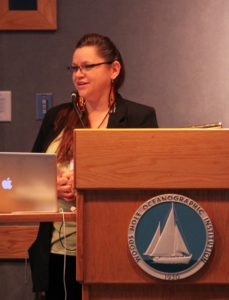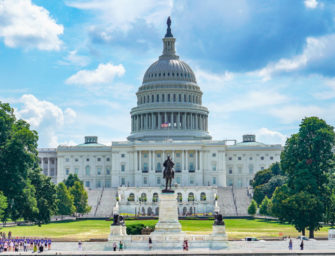November Native American Month – One Voice from the Margins

University of Kansas Geography Ph.D. Student Paulette Blanchard
Over the past 500 plus years Indigenous Peoples have been suffering the continued violence and genocide at the hands of the settler society. While there have been waves of civil rights movements, feminism, and actions toward social justice, we Native Peoples are still causalities of structural, systemic, institutional and environmental violence. This has led to hundreds of laws and policies designed to oppress and control Native “American Indians” and other Indigenous Peoples, often using “Science” to validate power holder agendas. How can we be postcolonial when still occupied by settler colonial power?
In the process of imperialism, settler colonists collected and claimed our lands, resources, knowledges, and used their science and religion to justify the erasure or appropriation of thousands of distinct Peoples knowledges. Today we see appropriations of our identities, knowledges, foods, hurtful racialized stereotyping of our images, and continued policies that make Native women and children vulnerable to abuse and death, while the pipeline to prison numbers of Natives are shamefully high. Settler colonial violence is perpetuated by science and scientists when silencing Indigenous voices to their land claims, disrupting relationships to place, our knowledges dismissed as antidotal, our creation stories called folklore, languages, histories, and cultures erased. Some Native students go to university to gain the agency needed to be heard or hopefully affect change by helping our people and lands live healthier. Rarely do we make it through the educational system.
Instead most Native students are subjugated, tokenized, used, leveraged for grants that do not help them or their people, subjected to racialized violence, suffer isolation, get little to no academic support, and surrounded by people who do not think, act, or look like them. Society and governmental policies have kept Tribes in a constant state of trauma. I realize how much has changed, and how much needs to yet change. “Civilization” will not grow or move forward in knowledge if we continue to depend only on one myopic “universal” Science grounded in Eurocentric, white, heteronormative, able bodied, patriarchy perpetuated not by wisdom or knowledge, but deliverables, products, technologies, money, and power. Meritocracy is shifting into corporatocracy creating indentured servitude through crippling student debts instead of innovative creativity through academic freedom and pluricultural intersectional justice.
During this month recognizing Native “Americans” I challenge all of you that read this to consider how your actions are agents of change, or continued settler colonial oppression. Does your work recognize on whose stolen land you and your institutions occupy and benefit from? Does your work better the lives of humans, the environment, and all life on the planet? Do you know any of the 36 tribal colleges and universities in the United States and does your university or institution support sciences at any of them? Does your work include the voices of the silenced and marginalized, or are you speaking for them? How many faculty members are Indigenous at your universities with communities that recognize them as belonging? How does your institution/discipline value Native American scientists who are culturally competent and can negotiate working in multiple intersectional spaces?
I challenge universities and other research institutions to hire recognized Native scientists, scholars, elders and knowledge holding community members, and to value them as equal to your own experts ― for they’re our experts. Apply what you already know and what other Indigenous Peoples have already shared with you. Help end perpetuating settler colonial narrative’s that continues to claim the “discovery of new knowledge” that has existed amongst Indigenous Peoples for millennia. If you want to recruit Native and other Indigenous Peoples, then there MUST be someone available with cultural competency to mentor these students and address their unique needs. You cannot expect Native Peoples to send you our young people to your institutions unless we know they are safe and what they learn is useful to them and their community.
If you want to truly be good allies, then start by being good neighbors and working together to dismantle settler colonialism, decolonize education, support sciences earlier in schools, build meaningful relationships with Tribes, know the tribal colleges in your regions, and fully support Native students in their academic journeys. Building these long meaningful relationships with people and place can only do good for all involved and when done in a good way, all will flourish. We must honor our Two-Spirit Peoples, women, and men equally. We are each active agents of necessary changes during difficult times.




Paulette Blanchard’s powerful talk at AGU 2018 brought me here to re-read her words. Thank you for writing this, Paulette, and sharing it at AGU. Your words give me and the geoscientific community much to reflect (and then act!) on.